Beyond guns, troops and tents
When women journalists report from conflict and
humanitarian crises :
Women and children often fare the worst during conflict and in
refugee situations. After the terrible earthquakes in Nepal this month,
Viviane Fluck, who is conducting a post-earthquake humanitarian
information assessment for Internews, noted that violence against women
has been on the rise during the disaster. Fluck recommends leveraging
Nepal’s vibrant community radio sector to help mitigate this situation.
On the other side of the world, in Chad, journalist Houda Malloum
reported for a community radio station set up by Internews to serve
refugees from Darfur. She focused an episode on the problem of attacks
on Darfuri women and girls who were leaving the refugee camps to gather
firewood. The episode helped alert local authorities to the problems of
violence against women, and at the same time gave the women alternatives
so that they could avoid areas where they might be attacked.
Women’s issues need to be heard so that humanitarian organizations
can respond to their particular needs. Women journalists can help drive
the debate beyond guns, troops and tents. Local women journalists can
provide a better understanding of what women need to take better care of
their families and safeguard themselves.
Many of the women journalists Internews has worked with in
humanitarian crises have risked their lives or pushed against societal
norms to become journalists and get women’s voices heard.
| Alice
Bafiala Mutombo, Democratic Republic of Congo
“The media educates the community about
their rights. To have their own radio station is very
important for a community it is a way for them to tell their
own stories, that they feel are important, in their own
voice, and I am so proud to be supporting that.”
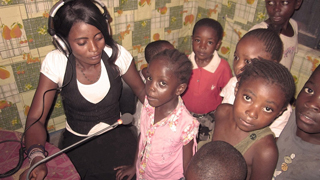 |
Women in South
Sudan listen to an Internews-supported radio
station. During the conflict in South Sudan,
Hellen Mangindo was on air continuously
providing listeners with a familiar, calm
presence and clear information on what was
happening. Hellen presents her own social
affairs show — Under the Tree — focusing on
women, children,
health, reconciliation and healing. (photo:
Emily LeRoux-Rutledge/ |
|
|
Ibtisam Omar,
Libya
“I want to make a program where I can
represent any girl in Libya. I can do this program instead
of her, and she can listen. As a result, society will
hopefully pay attention to girls and their needs.”
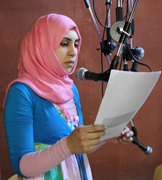 |
Reporting from the
Kenyan community of Dadaab — host to the world’s
largest
refugee camp — Fatuma Abdi Gedi’s reports have
made more women aware
of why their children should go to school and
helped them access health |
|
|
Kalaivani
Saravani
“The Sinhalese people in Akmeemana village
opened their hearts out to me even when they knew I was a
Tamil and couldn’t speak Sinhala.
I was touched when they wanted to tell me
their problems. They wanted their sufferings to be heard by
Tamil listeners of the radio stations. They, too, were
trying to reach out to their Tamil brothers and sisters to
say that all poor people have the same problems, regardless
of whether you are Sinhalese, Tamil or Muslim.”
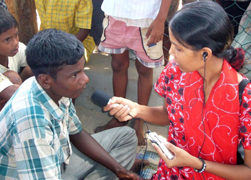 |
A journalist
interviews children in a radio studio in DRC.
Like many other children, Alice Mutombo spent
weeks marching through dense jungle, where she
listened to news of the war on a batteryoperated
radio and developed an interest in journalism.
(photo: Internews) |
|
|
Mary Wagura,
Kenya
“I used to arrive at the radio station
every day at 8 a.m. and not leave until the evening. It
didn’t matter that the sun was beating down against my head
as I sat on the bench outside the reception door. This went
on day after day until the management decided to hire me.”
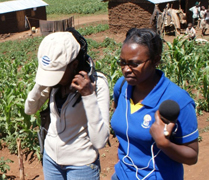 |
Until she
participated in a journalism training workshop
with
Internews,Kalaivani Saravani had a burning
hatred of the Sinahalese in Sri Lanka. They had
been responsible for the death of her father, a
Tamil. Kalaivani went through a personal
transformation after she was assigned to report
on a story where she had to interview Sinhalese
villagers. (photo: Matt Abud/Internews) |
|
|
Houda Malloum,
Chad
“As a woman, I feel as if it were me who
had lived through those moments. It’s difficult. African
women suffer a lot. If there is a possibility to help them,
to give them everything they need to help them avoid those
risks…”
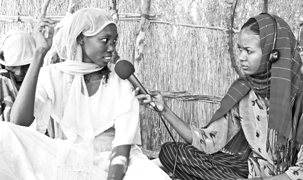 |
Journalist
Houda Malloum (right) interviews a woman
in a refugee camp in Chad for a weekly radio
show she produced — “She Speaks, She Listens.” —
that focused on violence against women and
girls.
(photo: Guillaume Michel/Internews) |
|
|
Hellen
Mangindo, South Sudan
“Most ladies get married early, you have a
family, you need the job and you have to complete your
assignments on time regardless of how you make ends meet at
home and at work. When you are determined, nothing will
deter you from your dreams. If you really want to be a
journalist, you can make it.”
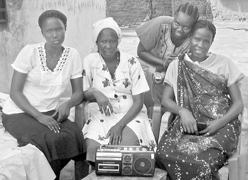 |
After the fall of
the Gaddafi regime in Libya, a group of young
people with no radio experience cobbled together
Radio Shabab FM, hoping to participate in
Libya’s budding civil society. (photo:
Benedict Moran/Internews) |
|
|
Amani Shnino,
Gaza
“I was really touched when I started
writing about the situation in Gaza, and one of the readers
posted a comment saying ‘Thank you Amani, you really touched
the reality of Gaza, and talked about things that concern
us.’”
In Gaza, children were happy to be back in
school with their teacher after the conflict wound down in
September 2014. Amani Shnino was selected for Internews’
multi-media training that included video reporting and story
production. Since then, she has been producing video and
radio reports, as well as writing a blog and a column about
IDP camps for a Lebanese journal. (photo: Julia Pitner/Internews)
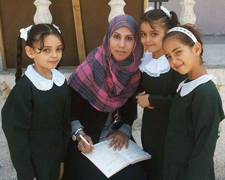 |
Mary Wagura
received training in conflict-sensitized
journalism as part of the Internews Reporting
for Peace project. The training equipped her
with essential skills to cover the aftermath of
Kenya’s post-election violence of 2008.
Impressed with her growing expertise in handling
conflict-related stories, Mary’s managers
decided to make her the dedicated “peace beat”
reporter. (photo: Internews) |
|
|
Fatuma Abdi
Gedi, Dadaab, Kenya
“Our community, they don’t usually have
women journalists or hear ladies on the radio. So through
the Gargaar program I have gotten the opportunity to be a
role model for others.”
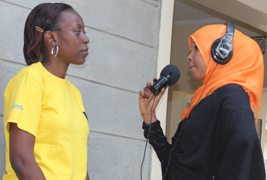 |
Journalist Houda
Malloum (right) interviews a woman in a refugee
camp in Chad for a weekly radio show she
produced — “She Speaks, She Listens.” — that
focused on violence against women and girls.
(photo: Guillaume Michel/Internews) |
|
|
Julia Paulo
Ding, South Sudan “I want to become
a better journalist. When I see people in the media, I want
to be like that. They’re doing a good job helping people by
sharing stories.”
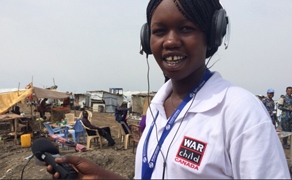 |
Julia Paulo Ding,
22, lives and works in the United Nations
Protection of Civilians (UN POC) site. She is
working with Internews, learning how to produce
humanitarian information audio programs. The
programs, calledBoom Box Talk Talk, serve as a
two-way communication platform for those living
in the
POC. (photo: Adam Bemma/Internews) |
|
|

